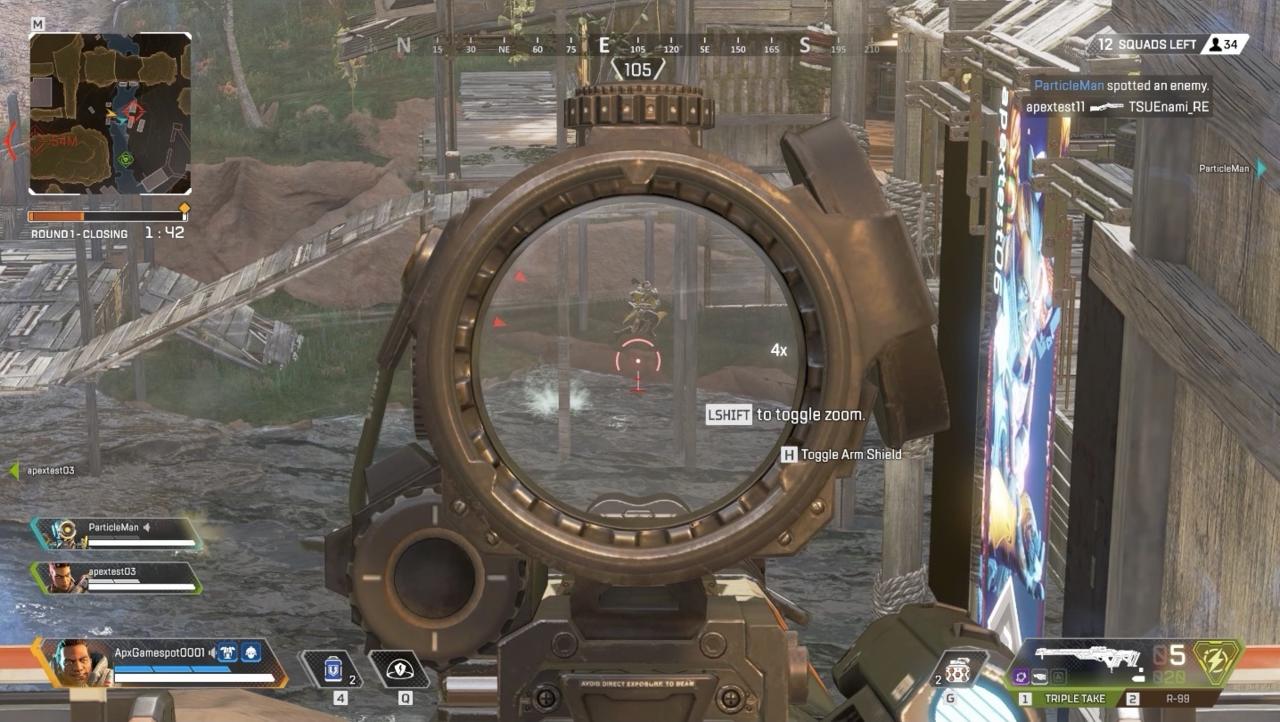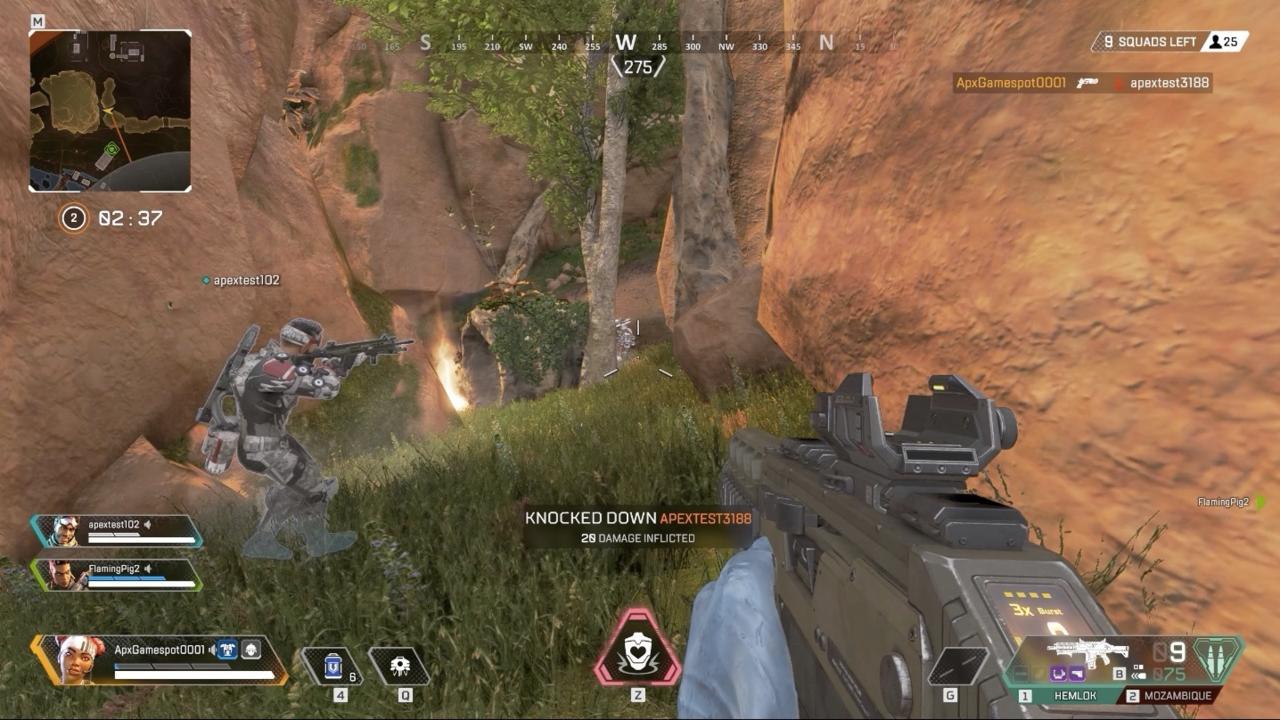Titanfall developer Respawn Entertainment's new game is Apex Legends, a free-to-play first-person battle royale shooter set to take on the likes of Fortnite, PlayerUnknown's Battlegrounds, and Call of Duty: Black Ops 4's Blackout mode. After a few leaks, Respawn gave the game a surprise launch, making it immediately available on PlayStation 4, PC, and Xbox One for players to try. Ahead of its launch, GameSpot spent about seven hours trying out Apex Legends at a preview event in Los Angeles, where Respawn showed off a lot of what the latest contender in the battle royale Thunderdome has to offer.
First up, no, it's not a new Titanfall game, although Apex Legends shares some DNA with Titanfall 2, Respawn's excellent 2017 shooter, and is set in the same universe 30 years after that game. And yes, it's battle royale, a genre that is both dominated by its own titans--specifically Fortnite--and getting crowded with small-scale spins on the formula and trend-chasing also-rans. Apex Legends has a lot in common with the looming figures in the battle royale landscape but with some key differences and improvements, like the addition of specific characters and roles and an emphasis on team play, that Respawn hopes will make the game stand out.
Apex Legends stands apart by putting all its focus on perfecting the team version of battle royale. It eschews the single-player 1-versus-100 style that Fortnite, Call of Duty, and PUBG all support, instead pitting 20 three-player squads against each other in every match. This is a battle royale game in which just about everything is built around getting you to think about and work together with your squad.

Defining Your Legend
It starts with what is Apex Legends' biggest change to the formula: the inclusion of a set of characters you choose from at the outset of each match. As in Overwatch or Rainbow Six Siege, each of the game's eight "Legends" has their own unique abilities (with several borrowed from Titanfall 2), and only one can be in a squad at a time.
Each of the characters you can choose from at the start of a match has one passive ability, a "tactical" ability you can activate with a button press and which runs on a cooldown, and an ultimate ability that charges up much more slowly. Passives include increased run speed when under fire or a shield that protects you while you're reviving a teammate, while tacticals are things like deploying a smoke grenade for cover, dropping a dome shield, or the ability to become briefly invisible and invulnerable.
The same is true with ultimates--one character, Gibraltar, can call in an air strike on a position, while Wraith opens up portals between two locations that teammates can use, and the medic Lifeline can call down a care package to a specific location. The core of battle royale--dropping into a huge space with nothing and quickly trying to find guns, ammo, and items that will help you survive and take down other squads--remains, but each of the character's capabilities, when combined with that of their teammates, lead to variable strategies.
Another Crab's Treasure Is A Soulslike 3D Platformer | GameSpot Review Stellar Blade Review Nintendo 64 – April 2024 Game Updates – Nintendo Switch Online Super Monkey Ball Banana Rumble - Official Multiplayer Features Trailer PUBG | Erangel Classic Returns Gori: Cuddly Carnage | Meow Launch Date Announcement Trailer Genshin Impact - "Arlecchino: Afterglow of Calamity" | Collected Miscellany Marvel Rivals - Official Loki Character Reveal Trailer | The King of Yggsgard Fortnite Festival - Official Billie Eilish Cinematic Season 3 Trailer Remnant 2 - The Forgotten Kingdom | DLC Launch Trailer Stellar Blade - Official "The Journey: Part 2" Behind The Scenes Trailer | PS5 Games Dead by Daylight | Tome 19: Splendor | Reveal Trailer
Please enter your date of birth to view this video
By clicking 'enter', you agree to GameSpot's
Terms of Use and Privacy Policy
Nonverbal Communication
Abilities are important at key points, but moment-to-moment teamwork is defined by the ping system, a robust way for you to communicate with your teammates even without talking to them. Apex Legends has a dedicated button that lets you call out points of interest to your squad, creating indicators that appear on their screens and messages from your character they can hear. Pings are contextual, so what you're aiming at when you use it dictates what's communicated. Point at a spot in the distance to suggest heading in that direction; point at a piece of loot, and you'll call out what it is and mark its location for your teammates who might need it. The ping system also has another button dedicated to marking enemy locations--which is amazingly useful, both in the heat of battle and as you move around the map. You can even bring up a wheel of messages to send, like suggesting a location to loot, or pointing out that an area shows signs of activity from another team.
The ping system makes working together easier, while an enhanced revival system means that death is not always the end for teams who play smart. Like in other battle royale games, taking a certain amount of damage knocks you down in Apex Legends, which means you're out of the fight until a teammate revives you. Enemy players can finish you off to take you out of the match before your revive timers runs out, but it's still possible for your teammates to bring you back.
The box of your loot that remains when you die contains a special item called a banner card that a teammate can retrieve within a certain amount of time. If they do, they can take the card to one of several special respawn points and call a dropship to bring you back into the match. Returning from the dead means you're stuck looking for brand-new gear, but it's better than being out of the game entirely. Respawning teammates adds a whole other strategic layer to matches by making respawn points potential centers for battles, while creating situations where it's possible for a team to recover from bad luck or a tough fight.
Another Crab's Treasure Is A Soulslike 3D Platformer | GameSpot Review Stellar Blade Review Nintendo 64 – April 2024 Game Updates – Nintendo Switch Online Super Monkey Ball Banana Rumble - Official Multiplayer Features Trailer PUBG | Erangel Classic Returns Gori: Cuddly Carnage | Meow Launch Date Announcement Trailer Genshin Impact - "Arlecchino: Afterglow of Calamity" | Collected Miscellany Marvel Rivals - Official Loki Character Reveal Trailer | The King of Yggsgard Fortnite Festival - Official Billie Eilish Cinematic Season 3 Trailer Remnant 2 - The Forgotten Kingdom | DLC Launch Trailer Stellar Blade - Official "The Journey: Part 2" Behind The Scenes Trailer | PS5 Games Dead by Daylight | Tome 19: Splendor | Reveal Trailer
Please enter your date of birth to view this video
By clicking 'enter', you agree to GameSpot's
Terms of Use and Privacy Policy
Accessibility Royale
All that emphasis on working together and fulfilling specific roles helps give Apex Legends a different feel from similar games, but a lot of what Respawn brings to the table is quality-of-life improvements to systems that are already pretty ubiquitous to the battle royale genre. Drawing from Titanfall 2, movement in the game is quick and fluid; running and sliding make you nimble, and climbing and mantling just about anything adds a level of verticality. There's no wall-running, unfortunately--Respawn told us it compromised team dynamics because players would end up too spread apart as they went parkouring around the environment--but Apex Legends still maintains a Titanfall-like degree of fluidity and freedom in its movement that's refreshing.
It might also be the easiest BR game to understand in terms of how loot functions. A hallmark of the genre, Apex Legends' map is littered with stuff to pick up, and that means plenty of options of guns, each requiring certain types of ammo and supporting different attachments that can improve their performance. Learning to manage all those items is a big part of battle royale, but Respawn's interface and mechanics for dealing with all your gear is highly intuitive. Weapons are color-coded to their ammo types, so you know instantly when you see a box of light ammo whether it fits that pistol you just grabbed or the rifle you're using. Gear rarity is also dictated by color, as in other BR games, but Apex Legends explicitly tells you whether the thing you're about to pick up is better or worse than what you're already carrying, and in many cases doesn't even allow you to pick up gear that would replace stronger items you already have.
The interface also takes the guesswork out of dealing with all the various weapon attachments you can find in the game. When you find a scope or stock that fits your gun, it attaches automatically. Find a better one and the old one is replaced. If you decide to swap one shotgun for another, for example, all the appropriate attachments on the gun you're discarding are automatically flipped to the new gun. Apex Legends functions so you almost never have to open its inventory screen. If you do pop open your inventory, the game marks items you are carrying but can't use, like ammo or attachments for guns you don't have, so they're easy to toss to make room. It all makes dealing with the stuff you find extremely easy and minimizes the time you have to spend organizing your junk, which can be one of the genre's weakest elements.

The lingering question, though, is whether the world needs another battle royale shooter. Coming off Titanfall 2, a great realization of a bunch of fresh ideas Respawn brought to the shooter genre, Apex Legends can often feel like it's mixing and matching the best elements of other games. Like all battle royale titles, there's an extreme familiarity in Apex Legends--if you've played Fortnite or PUBG, you've experienced a lot of what Apex Legends has to offer already, even though there's some new spin. And while the character system adds a lot of new tactical possibilities to battle royale, the mind immediately jumps to Overwatch, the king of the hero shooter. Many of these ideas are well-established in games shooter fans are probably already playing.
All that said, Respawn has proven itself in terms of shooter design with the Titanfall games, and a lot of the same tight shooting controls make their way into Apex Legends. It's not a stretch to say this feels like one of the best put-together of the battle royale games from a mechanics standpoint. A strong focus on teamwork helps Apex Legends to carve out a specific spot in the battle royale field, and with the super-low barrier of entry from its free price point (we've got more info on its monetization and a look at the game's best skins), it may well have a chance of contending with the monumental success of its competitors. Since Apex Legends is available right now, we'll have a full review coming over the next few days.











